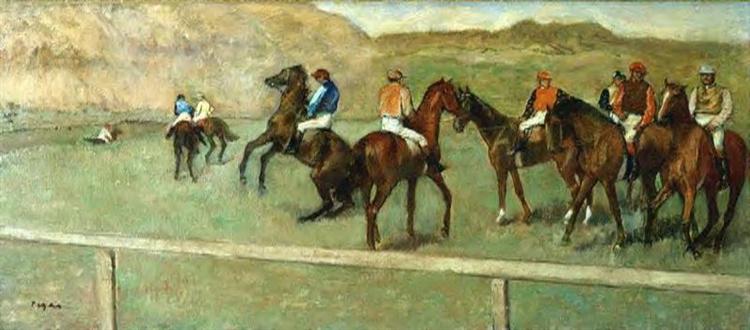Beschreibung
Edgar Degas's Before the Beginning (1878) is a shining example of his mastery in capturing the movement and vitality of everyday life, especially in the sphere of ballet, a recurring theme throughout his career. In this painting, Degas presents a singular and evocative scene that encapsulates the anticipation of the moment before the action, an event that is rarely portrayed in the painting tradition. With his distinctive focus on the human figure and his ability to convey the emotion and tension that precedes a performance, Degas transforms the moment into an intimate visual narrative.
The composition of the work is rich and complex, centering on a young dancer who, in a poised and contemplative pose, appears to be preparing for a performance that is about to begin. The use of a high angle and unusual perspective is a strategy that Degas uses to capture the dynamism of the moment, suggesting that the viewer is in a privileged place, observing a background in which intimacy is found before public display. The central figure of the dancer is surrounded, albeit diffusely, by other dancers preparing, creating a sense of community and camaraderie in the context of artistic endeavor.
The color in Before the Beginning is notable, particularly the soft, nuanced palette Degas chooses to use. Shades of pink and green intertwine in the dancers' attire, creating a contrast with the darker, more somber background. This chromatic approach not only brings the figures to life, but also establishes an emotional contrast that invites the viewer to immerse themselves in the tension of the moment, sharply defined between the calm of preparation and the impending explosion of movement and performance.
One of the most significant aspects of Degas' work is his attention to light and its effect on the environment. Here, the light seems to filter through gently, caressing the figures and highlighting the almost ethereal quality of the dancers. Degas, known for his experimentation with the use of light in his works, manages to create a feeling of depth through subtle shadows and nuances, lending a palpable sense of three-dimensionality to the two-dimensional plane of the canvas. The fine textures of his brushstrokes indicate both the movement of the fabric and the plasticity of the bodies in question.
Degas is known for his innovative approach to the human form, particularly in his depictions of ballerinas. His interest in unusual angles, capturing fleeting gestures and intimate moments contribute to a visual narrative that transcends mere representation. In Before the Beginning, this interest is manifest in the delicate posture of the dancer, whose expression appears contemplative yet animated, a dichotomy that invites the viewer to reflect on what the beginning of a performance represents for the artists in question.
It is important to note that this work aligns with Degas's Impressionist period, although his technique often transcends those limitations by incorporating more classical elements in his finish. His dedicated study of anatomy and the human form sets him apart from many of his contemporaries and evidences his desire to elevate dance to an art form worthy of attention in the art world, not just as a spectacle.
Before the Beginning is in constant dialogue with other works by the same author that capture the spirit of ballet. When compared to his famous series of ballerinas on stage, this painting anticipates the energy of performance, but also reflects the vulnerability and discipline behind the art of ballet. The work encapsulates a pivotal moment in the ballerina's life that, though transitory, is imbued with meaning and emotion, inviting contemplation on the sacrifice and dedication that a life of performance entails.
In sum, Before the Beginning is a work that not only highlights Edgar Degas’ technical prowess and narrative innovation, but also reminds us of the inherent beauty of the art of dance itself. It invites us to weigh the moments of preparation with the same reverence as the grand acts of performance, blurring the lines between what is mundane and what is extraordinary—a legacy that continues to resonate in the art world and beyond.
KUADROS ©, a famous painting on your wall.
Hand-made oil painting reproductions, with the quality of professional artists and the distinctive seal of KUADROS ©.
Painting reproduction service with satisfaction guarantee. If you are not completely satisfied with the replica of your painting, we will refund 100% of your money.

